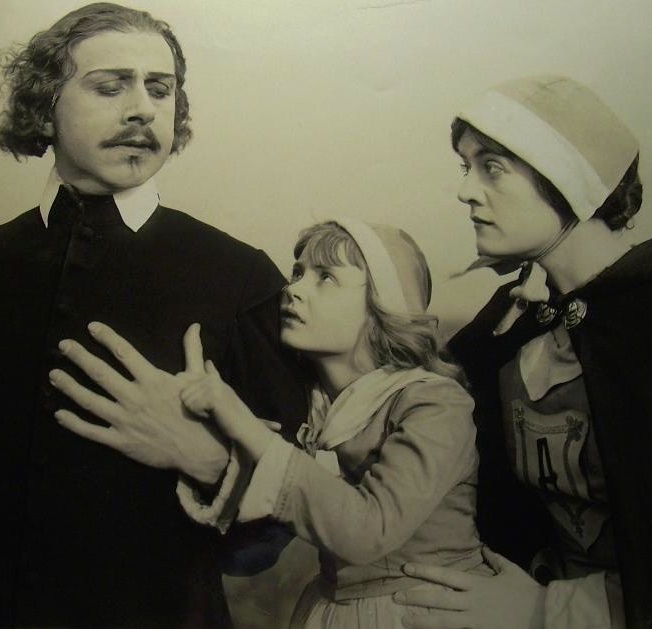
by Richard Subber | Mar 22, 2023 | Human Nature, Theater and play reviews
that feel-good feeling…
Movie review:
Winter’s Tale
2014
Rated PG-13
118 minutes
Starring Colin Farrell, Jessica Brown Findlay, Russell Crowe
Winter’s Tale offers a gripping combination of magic, miracle, young love, and gritty good vs. evil plot lines. It’s just what you need to guarantee the feel-good feeling as you finish watching the movie some night soon.
Using words to describe it is a challenge. Winter’s Tale (2014, rated PG-13, 118 minutes) creates the characters and then rushes to convergence at the end: Beverly (Jessica Brown Findlay) imparts her miracle to Peter (Colin Farrell), Peter fights evil to create goodness, the girl will live, the magic horse prances into the sky, and love conquers all.
This is a tale about a world as we would like it to be, and the kind of love we all wish everyone could have. It’s proof that the slightest breath of angels can make magic.
* * * * * *
Movie review. Copyright © Richard Carl Subber 2023 All rights reserved.
Book review: Hag-Seed
by Margaret Atwood…it ain’t Shakespeare
–
As with another eye: Poems of exactitude with 55 free verse and haiku poems,
and the rest of my poetry books are for sale on Amazon (paperback and Kindle)
and free in Kindle Unlimited, search Amazon for “Richard Carl Subber”
* * * * * *

by Richard Subber | Aug 31, 2022 | Book reviews, Books, Joys of reading, Theater and play reviews
the movies ignore the real story…
Movie review:
The Scarlet Letter
by Nathaniel Hawthorne (1804-1864)
Published 1850
I watched three films based on Nathaniel Hawthorne’s iconic story, The Scarlet Letter. My small sample (there are at least nine movies based on the story) confirms that Hollywood really can’t stand the story as Hawthorne wrote it.
Read my review of Hawthorne’s book, click here.
In 1934 Colleen Moore played Hester Prynne and Hardie Albright played Rev. Arthur Dimmesdale in the tale about Puritan condemnation of adultery and children born out of wedlock. Hester is sentenced to wear an embroidered scarlet letter “A” on her bosom, and Dimmesdale endlessly rationalizes his decision to conceal his role as the mysterious father of little Pearl. The movie reflects the production limitations and typical dramatic direction in the 1930s—there’s a lot of staring into the camera, and crowded action scenes.
Meg Foster played Hester and John Heard played Dimmesdale in the 1979 TV miniseries about The Scarlet Letter. There are recognizable scenes from the book. The script is nondescript. It’s a ponderous distillation of Hawthorne’s words.
The 1996 version with Demi Moore as Hester and Gary Oldman as Dimmesdale apparently is the latest in the unsatisfying series of film versions of The Scarlet Letter. It is an almost lurid mal-adaptation of the book. The hot scenes featuring Hester and Dimmesdale attracted to each other are a complete invention—Hawthorne eschews any explicit reference or description of physical intimacy between his principal characters. Demi and Gary get it on, but it ain’t Hawthorne.
In all three films, the role of little Pearl is deliberately underplayed. The child is a principal factor in the story—her feelings, her joie de vivre, her contemplations, her maturation are fully explored in the book, and ignored in the movies.
The mental and emotional quagmires that are explored and endured by Hester and Dimmesdale are generally ignored in the movies. None of the movies uses the ending that fulfills the book.
In short, for my taste, if you want to claim that you are familiar with the themes, plot, and denouement of The Scarlet Letter, you have to read the book.
The movies are scandalously thin and false charades of the powerful drama of Hawthorne’s story that was published very successfully in 1850.
If you think you remember reading it a long time ago, try it again.
* * * * * *
Movie review. Copyright © Richard Carl Subber 2022 All rights reserved.
Book review: Shantung Compound
They didn’t care much
about each other…
by Langdon Gilkey
–
My first name was rain: A dreamery of poems with 53 free verse and haiku poems,
and the rest of my poetry books are for sale on Amazon (paperback and Kindle)
and free in Kindle Unlimited, search Amazon for “Richard Carl Subber”
* * * * * *

by Richard Subber | Apr 4, 2022 | Human Nature, Theater and play reviews, Tidbits
…ready to pop…
Patrick Swayze, Jennifer Grey
Director: Emile Ardolino
100 minutes
Oscar for Best Music, Original Song: “The Time Of My Life”
I want to go deeper than the “ugly duckling/Prince Charming/red hot final dance” story—for me, highlights of the film are Baby’s naiveté, and her ingenuous embrace of the very hot Johnny, and her eager awareness of her rising woman’s heat…
Some context: in 1987 many Dirty Dancing viewers would have been more than slightly discomfited by the matter-of-fact abortion episode, and perhaps nonplussed by Baby’s casual deception to come up with the $250 to pay for it. Wowee. It’s great to help out a friend of a friend and all, but that seems like a baffling stretch for a timorous young girl of Baby’s obvious unworldliness.
On the other hand, Baby’s hormones are ready to pop.
You know, you really can say “dirty dancing” in a nice way.
Alone with Johnny, in the prelude to intimacy scene, Baby suddenly opens up: “I’m scared of everything…I’m scared of who I am, and most of all I’m scared of walking out of this room and never feeling the rest of my whole life the way I feel when I’m with you.”
That’s a heartbeat. You felt it, too.
Here’s hoping that you’ve had a moment, an embrace, a volcanic new feeling of desire that you feared you would never feel the rest of your whole life.
I have.
And now I know I didn’t have to be afraid.
* * * * * *
Movie review. Copyright © Richard Carl Subber 2022 All rights reserved.
Book review: Tales from Shakespeare
the summaries by Charles and Mary Lamb…
–
My first name was rain: A dreamery of poems with 53 free verse and haiku poems,
and the rest of my poetry books are for sale on Amazon (paperback and Kindle)
and free in Kindle Unlimited, search Amazon for “Richard Carl Subber”
* * * * * *

by Richard Subber | Jan 19, 2021 | Human Nature, Theater and play reviews
a first-class bad guy…
Movie review:
The Wind and the Lion (1975)
Candice Bergen as Mrs. Eden Pedecaris.
Sean Connery as Mulay Achmed Mohammed el-Raisuli, Lord of the Rif and Sultan to the Berbers.
In real life he was Mulai Ahmed er Raisuni (Raisuli) (1871-1925), a Sherif and Lord of the Rif in Morocco, a tribal leader and brigand, “the last of the Barbary pirates.”
The Wind and the Lion is a dramatic interpretation of a real incident in Morocco in 1904. The real Raisuli kidnapped an American, Ion “Jon” Hanford Perdicaris (1840-1925) and his stepson, and held the two for ransom. President Teddy Roosevelt sent U. S. marines to rescue the men. Ultimately, the government of Morocco paid the ransom and the men were released.
The movie is wonderfully dashing, and the brutal details are romantically minimized. The captive American, Candice Bergen, doesn’t quite fall in love with Sean Connery, but it seems to be a close call.
Connery, with all of his moustaches and flowing robes, is a first class bad-guy hero, and he has a good heart. He’s happy to get his money, but he’s sorry to say goodbye to Mrs. Pedecaris.
In the final scene, the Raisuli and his lieutenant, the Sherif of Wazan, are silhouetted on a high beach against the setting sun, and the Sherif plaintively declares “Great Raisuli, we have lost everything. All is drifting on the wind as you said. We have lost everything.”
Raisuli revives the heart throbs: “Sherif, is there not one thing in your life that is worth losing everything for?”
* * * * * *
Movie review. Copyright © Richard Carl Subber 2021 All rights reserved.
Book review: The Proud Tower
…a lot more than a history book…
by Barbara Tuchman
–
Seeing far: Selected poems with 47 free verse and haiku poems,
and the rest of my poetry books are for sale on Amazon (paperback and Kindle)
and free in Kindle Unlimited, search Amazon for “Richard Carl Subber”
* * * * * *

by Richard Subber | Dec 22, 2020 | Human Nature, Reflections, Theater and play reviews, Tidbits
Guess who wasn’t coming to dinner at your house in 1967…
Well, if you grew up in a white family, it’s a pretty good bet that a handsome black guy—a doctor!—wasn’t planning on sitting down to dinner and telling you he planned to marry your daughter.
That’s the reality that was.
So, about 50 years ago, Katharine Hepburn and Spencer Tracy and Sidney Poitier and Katharine Houghton and Beah Richards and Roy Glenn got crazy in Hollywood and filmed Guess Who’s Coming to Dinner. It was a blockbuster. Houghton (daughter) and Poitier (doctor) played lovely young people who were in love, and everybody got with the program by the end of the movie, and they lived happily ever after. (There were Oscars, click here).
It’s a poignant and dramatically dynamic movie. Every character throws firecrackers at least a couple times, and everybody catches the firecrackers with high art and deftly normalized social criticism and passionate declarations about the right thing.
I’ve watched it several times. For me, it doesn’t get old. I like to live in the world with people who say “If you love somebody, you gotta love somebody, so go ahead and do it.”
The movie turned a lot of heads, but I’m guessing it didn’t change a whole lot of minds.
….and don’t forget that the last recorded lynching of a black man (Michael Donald) in America was near Mobile, Alabama, in 1981.
* * * * * *
Movie review. Copyright © Richard Carl Subber 2020 All rights reserved.
Book review: The Blithedale Romance
by Nathaniel Hawthorne, not his best…
–
Writing Rainbows: Poems for Grown-Ups with 59 free verse and haiku poems,
and the rest of my poetry books are for sale on Amazon (paperback and Kindle)
and free in Kindle Unlimited, search Amazon for “Richard Carl Subber”
* * * * * *

by Richard Subber | Aug 20, 2018 | Theater and play reviews, Tidbits
A slow eruption of despair…
Review:
The Iceman Cometh
A play by Eugene O’Neill (1888-1953)
Written in 1939, first performance in 1946
Stamina is one thing you need to load up on so you can read or watch The Iceman Cometh.
Pathos, not so much. Your usual willingness to embrace pathos will be fully engaged, because Eugene O’Neill boiled this play in pathos.
The short version:
A bunch of broke-down drunks in a 1912 Greenwich Village bar sprawl in the chairs, mutually reinforcing their relentless pursuit of a maundering besotted state that creates the milieu for exercising their pipe dreams.
When their hero, the traveling salesman they call Hickey, tries to talk them into exorcizing their pipe dreams, they oh so tentatively agree…but they fail in oh so predictable ways.
In the final scene, Larry—forlorn, a lapsed anarchist—mutters “Life is too much for me, I’ll be a weak fool, looking with pity at the two sides of everything ‘til the day I die.”
That’s really The Iceman Cometh, in simplest language. It distinctly examines only one side of everything. The play makes no pretense about having redeeming qualities. It’s a slow eruption of despair. It’s a slow walk through the dark side. There is no exit except death’s door. I was glad, at the end, when I could stop watching it.
Early in his career, Marlon Brando turned down an offer to play a key role in Iceman, saying that O’Neill’s work was “ineptly written and poorly constructed.” To each his own.
I think The Iceman Cometh is a masterpiece of truth-telling. He tells some truths about life that are all too real for some people, and all too horrid contingencies for the rest.
I imagine that watching it is a lot less terrifying than living it.
* * * * * *
Copyright © Richard Carl Subber 2017 All rights reserved.
–
In other words: Poems for your eyes and ears with 64 free verse and haiku poems,
and the rest of my poetry books are for sale on Amazon (paperback and Kindle)
and free in Kindle Unlimited, search Amazon for “Richard Carl Subber”
Book review:
Shakespeare: The World as Stage
The Bard was the lucky one…
click here





